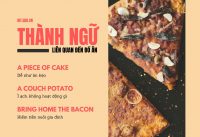Bài luận tiếng Anh theo chủ đề (Phần 3)
What career would you like to choose after leaving school
Bài mẫu
Today, it is not easy to choose a career. Hundreds of students pass various examinations every year and compete with one another for positions in the various professions which are not so many as there are applicants. I would, however, like to choose teaching as my career.
Teaching is an interesting career for several reasons. As a teacher I can learn many things, especially if I teach to an udder-secondary school. If I teach History or English, for example, I have to read many books to make my teaching lessons more interesting to my pupils. Thus, I can acquire more knowledge of the subjects that I teach than what I can learn from the class text books. It is indeed a fact that a teacher learns a lot from the class text books; but that is hardly enough to make the teacher’s lessons interesting to pupils. A good teacher must therefore read many other books.
Again, as a teacher, I have to speak well so that my pupils will be able to understand my instructions well. In this way I can improve my powers of expression. Even my pronunciation of words will improve to great extent.
Further, as a teacher, I shall have enough leisure to read and prepare for various examinations. It is possible today to sit for many important examinations by studying entirely at home. Thus, I can acquire important qualifications.
Finally, as a teacher I will be respected as an educated person. People will assume that I have certain qualifications and show their regard for me and the opinions that I express. Thus, I shall be able to live a happy
Bài dịch
Ngày nay, chọn nghề là một điều chẳng dễ dàng. Hàng trăm sinh viên trải qua nhiều kỳ thi mỗi năm và tranh đua với nhau để giành chỗ trong nhiều ngành nghề khác nhau mà số lượng ít ỏi hơn nhiều so với số ứng cử viên. Còn tôi, tôi muốn trở thành một thầy giáo.
Có nhiều lý do để cho rằng dạy học là một nghề thú vị. Làm giáo viên tôi có thể học hỏi được nhiều điều, đặc biệt nếu tôi dạy ớ một trường trung học phổ thông. Nếu tôi dạy Lịch sử hay Anh văn chẳng hạn, tôi phải đọc nhiều sách để bài giảng trở nên thú vị hơn đối với học sinh. Như vậy tôi sẽ tiếp thu được nhiều kiến thức về các đề tài mình đang dạy hơn là những gì có thể đọc qua sách giáo khoa ở lớp. Quả thực không thể phủ nhận rằng một giáo viên học được rất nhiều điều từ sách giáo khoa; nhưng như thế vẫn chưa đủ để làm cho bài học hấp dẫn với học sinh. Một giáo viên giỏi phải đọc nhiều quyển sách khác nữa.
Tương tự, để làm một giáo viên giỏi tôi phải có khả năng diễn đạt tốt để học sinh có thể hiểu được những chỉ dẫn của mình. Bằng cách này tôi có thể phát triển khả năng diễn đạt của mình. Ngay cả cách phát âm của tôi cũng sẽ tốt hơn nhiều.
Hơn nữa, nếu là một giáo viên tôi sẽ có đủ thời gian rảnh rỗi để đọc sách và ôn luyện cho nhiều kỳ thi khác nhau. Ngày nay chúng ta có thể hoàn toàn tự học ở nhà để ôn luyện cho nhiều kỳ thi quan trọng. Nhờ vậy tôi có thể có những bằng cấp quan trong.
Cuối cùng, khi làm giáo viên tôi sẽ được kính trọng như một người trí thức. Mọi người sẽ công nhận rằng tôi có năng lực, họ sẽ coi trọng tôi cũng như những ý kiến tôi đưa ra. Như vậy cuộc sống của tôi sẽ rất hạnh phúc.
New words:
- career (n): nghề nghiệp, sự nghiệp
- applicant (n): người xin việc
- upper-secondary school: trường trung học, phổ thông, cấp ba
- pronunciation (n): sự phát âm, cách phát âm
- leisure (n): thời gian nhàn rỗi
- entirely (adv): hoàn toàn, toàn vẹn, trọn vẹn
- qualification (n): khả năng chuyên môn, trình độ chuyên môn, tiêu chuẩn chuyên môn, văn bằng, học vị
- respect (v): kính trọng, tôn trọng
- assume (v): cho rằng, thừa nhận
Why is agriculture important in the world of today?
Bài mẫu
Since the dawn of history, agriculture has been one of the important means of producing food for human consumption. Today more and more lands are being developed for the production of a large variety of crops. In Asia, vast areas of land are being used to produce rice, wheat, rubber and a variety of other crops. More than half of the lands occupied and developed by human beings in the world are devoted to agriculture.
That agriculture is one of the most essential means of producing food is realised easily when we think of the types of things that we eat. The rice or wheat that we eat comes from the land. Even potatoes and other roots or vegetables and even leaves such as tea, as well as the fruits that men eat are the products of the soil that covers the earth. In fact, everything that we eat, except meat, fish and other kinds of flesh come from the land, and what grows on the land is part of agriculture. Even the sugar, oil, coffee and other beverages that we use are products of plants that grow on land. In the same way, many of the medicines that we use are made of plants that grow in various parts of the world. The tobacco that we use for relaxation also comes from a plant.
Thus, it can be easily observed that without agriculture we would be almost without food. It is true, however, that in the remote past men did live mainly on flesh that he obtained by hunting. But such a kind of life was unhappy and inconvenient, for animals were not found everywhere easily. Therefore, men turned to agriculture for his livelihood. Today, agriculture continues to provide almost all the food that men require to survive on the earth.
Bài dịch
Từ buổi bình minh của lịch sử, nông nghiệp đã trở thành phương tiện sản xuất thực phẩm quan trọng cho con người tiêu thụ. Hiện nay ngày càng có nhiều đất đai được khai khẩn để sản xuất những vụ mùa lớn. Ớ châu Á những vùng đất mênh mông đang được sử dụng để trồng lúa gạo, lúa mạch, cao su và nhiều hoa màu khác. Hơn một nửa diện tích đất đai mà con người đã chiếm hữu và khai phá trên thế giới được dành để phát triển nông nghiệp.
Tầm quan trọng thiết yếu của nông nghiệp trong vai trò phương tiện sản xuất thực phẩm có thể được dễ dàng nhận ra khi chúng ta nghĩ đến các loại thực phẩm mình thường ăn. Lúa gạo và lúa mạch chúng ta ăn mọc từ đồng ruộng. Ngay cả khoai tây hay những loại rau củ khác, kể cả lá cây như lá trà, cũng như các loại trái cây mà cũng là sản phẩm của lớp đất bao phủ bề mặt trái đất. Trên thực tế, tất cả những gì chúng ta ăn trừ thịt, cá và những thứ thịt sống khác đều sinh ra từ đất đai, và những gì mọc trên đất đều là một phần của nông nghiệp. Ngay cả đường, dầu, cà phê và các thức uống khác cũng đều là sản phẩm của thực vật mọc trên đất. Tương tự, nhiều vị thuốc chúng ta lấy từ các thực vật ở nhiều nơi trên thế giới. Thuốc lá mà chúng ta dùng để thư giãn cũng lấy từ một loại cây.
Như vậy dễ dàng nhận thấy rằng không có nông nghiệp, chúng ta hầu như cũng không có thực phẩm. Tuy nhiên sự thật là vào thời xa xưa con người sống chủ yếu nhờ vào thịt động vật kiếm được khi săn bắn. Nhưng một cuộc sống như thế không sung sướng và thoải mái bởi vì không phải ở đâu cũng dễ dàng tìm thấy thú vật. Vì vậy con người chuyển sang nông nghiệp để nuôi sống bản thân họ. Ngày nay, nông nghiệp tiếp tục cung cấp phần lớn lương thực cần thiết cho sự tồn tại của loài người trên trái đất.
New words:
- dawn (n): bình minh, buổi đầu
- agriculture (n): nông nghiệp
- consumption (n): sự tiêu thụ, sự tiêu dùng
- variety (n): nhiều thứ đủ 1oại, sự đa dạng
- flesh : thịt
- remote (adj): xa xôi, xa xăm
- inconvenient (adj): bất tiện, thiếu tiện nghi
- livelihood (n): phương kế sinh nhai, sinh kế
PHẦN 2
A heroic deed
The story of man is full of heroic deeds. One of the acts of heroism that I have seen myself was that of my uncle, who was attacked by a huge tiger while we were in our plantation, one day. My uncle, a young and well-built man, and I had left our home early in the morning to do some work in the plantation. When we reached there, we could hear some dogs barking in the distance. But we did not suspect anything, and began to do our work.
While we were working, however, we noticed some foot-prints of some animal. We then examined them closely and were satisfied that they did not belong to any member of the cat family, the most ferocious of animals. We then resumed our work. My uncle took a long knife and began to cut some sticks and branches of plants scattered throughout the plantation, while I did some other work. Soon, however, I saw a movement in the bush, a short distance away. I was alarmed. I ran up to my uncle to draw his attention, but he was hardly interested in what I had to say. He continued to do his work. But shortly afterwards, my uncle himself observed the movement in the bush. Yet, he showed no signs of fear, and his composure dispelled my anxieties. He warned me, however, to be careful, and picked up an axe that had been lying on the ground. His knife, he gave to me. Then, he moved slowly and cautiously towards the bush, ready for any attack.
To our horror, a huge tiger soon emerged from the bush. But my uncle was prepared to face it, to escape seemed impossible. The tiger too seemed to be fully aware of the strength and courage of its adversary. It paused several times while advancing towards my uncle. Then all of a sudden, it sprang on my uncle, but his agility enabled him to escape the sharp claws of the brute with the slightest injury. Now with the axe still in his firm grip, my uncle struck the tigers face again and again, until it was bleeding profusely. The length of the handle of the axe made it difficult for the tiger to get to close to my uncle. That the tiger was at a disadvantage was clear to me from the beginning. In the end, however, the tiger collapsed and died. Within hours, after that all the people in our area heard of my uncle’s bravery, which saved us both from death. It was indeed a greatest act of heroism that I had witnessed.
New words:
- heroic deed (n): hành động dũng cảm
- plantation (n): đồn điền, vườn cây, khu đất trồng trọt
- well-built (adj): lực lưỡng, cường tráng
- suspect (v): nghi, nghi ngờ, hoài nghi, ngờ vực
- ferocious (adj): dữ tợn, hung ác
- composure (n): sự bình tĩnh, sự điềm tĩnh
- cautiously (adv): cẩn thận, thận trọng
8 . horror (n): nỗi kinh hoàng, sự khiếp sợ, sự ghê rợn
- spring (sprang-sprung) (v): nhảy, bật mình
- agility (n): sự nhanh nhẹn, sự lẹ làng, sự lanh lợi
- profusely (adv): ướt đẫm, nhiều, dồi dào
- collapse (v): đổ sụp xuống, ngã gục
Crimes in society
The human society is full of activity. People work in all kinds of business Firms, government offices, factories and other places, to earn their livelihood. Some work from dawn till dark; many work only at night; and others work during the day. At the same time men with criminal tendency are engaged in all kinds of activity, which often cause great hardship and sorrow to a large number of people in society.
Men develop criminal tendencies because of numerous frustrations. Society has always failed to satisfy the social, emotional and other needs of a large number of people, many of whom have therefore turned to crime for either survival or recognition. The activities of such men represent a constant threat to the welfare society, and much being done to reform them.
But criminals cannot be reformed until they are apprehended. By that time, hundreds of people are forced to live in fear at the hands of criminals, who resort to violence at the slightest provocation. Numerous people of various descriptions have been killed by criminals without proper cause. Society is therefore straining all its resources to bring criminals to justice. Large sums of money are being spent to employ men and equipment for the prevention and detection of crime.
Criminals are desperate men, and when they are pursued, they fight tooth and nail to escape capture. Therefore, those who are employed to capture them have to be brave, intelligent and well-trained men. To have such men always on the alert for the protection of society involves much expenditure.
Punishment of criminals today, however, is not the same as what it was in the past. Society has realized its responsibility towards individuals who always find a bone to pick with ít. It is now believed that criminals could be reformed. Therefore, psychologists and others who are responsible for the welfare of criminals are doing their utmost to train criminals to live a good life in the future. Only those who commit the most serious crimes are punished severely to deter others from committing such crimes.
New words:
- tendency (n): xu hướng, khuynh hướng
- engage (v): tham gia vào
- hardship (n): sự thử thách gay go; sự gian khổ
- numerous (adj): nhiều, đông đảo
- frustration (n): tâm trạng thất vọng, tâm trạng vỡ mộng, sự làm thất bại, sự làm hỏng
- welfare (n): hạnh phúc, sự thịnh vượng
- provocation (n): sự khiêu khích
- well-trained (n): được giáo dục tốt
- expenditure (n): chi phí, phí tổn
- utmost (adj): mức sống
A strange happening
The mysteries of nature have always fascinated the human mind, and many of them remain unsolved for a long time. The story that I am about to relate concerns a mysterious relationship between a baby boy and a snake somewhere in Malaysia.
I was indeed intrigued when I read a report in a newspaper sometime ago that a snake had suddenly appeared in a room, with the birth of a child and that it had attempted to show some relationship with the child. I could hardly believe it. The report added that the mother or the child was finally convinced that there was indeed some relationship between her child and the snake and she allowed the snake complete freedom to play and live with the child. To make sure that the report was true, I made up my mind to visit the house where this unnatural relationship between a reptile and a human being was established.
Then, one morning, my brothers, sisters and I arrived at the house, not very far from ours. As we enter the house we were greatly surprised to find a baby boy and a large snake playing with each other mirthfully. Soon, the mother of the child appeared and narrated the events that led to the snake and the child to live together. It seems that the snake was found lying near the baby just a few hours after the baby was born. A man was called in to kill the snake; but every time the man struck at it with the stick that he brought, the child cried with pain. The man then tried to take the snake out of the room, but again the child began to cry. The child’s mother then realised that there was some mysterious relationship between the snake and her child. She ordered the man to stop molesting the reptile, and to the surprise of all those who had arrived on the scene, the child stopped crying. The snake then returned to the child without attempting to harm anyone. Since then the snake has been fed by the mother of the child, and the snake and the child have been living together as brothers.
To see this strange occurrence, many people from all parts of the country come everyday. It is said that the snake, by its touch, has cured many sick people; but the mystery remains unsolved.
New words:
- fascinate (v): mê hoặc, quyến rũ, làm mê
- intrigue (v): hấp dẫn, gợi thích thú, kích thích tò mò
- convince (adj): tin chắc, đoán chắc
- reptile (n): loài bò sát
- mirthfully (adv): vui, vui vẻ
- narrate (v): kể lại, thuật lại
- bitterly (adv): một cách đau đớn, quyết liệt, cay đắng, chua chát
- molest (v): quấy rầy, quấy nhiễu, làm phiền
A journey by train
The house in which I lived before was near the railway station. Trains used to pass by at regular interval and I had become so familiar with their sound and sight that I took little interest in them. It never occurred to me that I might make journey by train some day. However, when my father decided to take up a new appointment in the place where we now live, it was decided that we should travel by train. It was only then that I discovered how pleasant a journey by train might be.
My father, mother and I boarded a train one afternoon. As the train moved out of the station, I began to think of the days I had spent in our old house which I could still see from the train. But soon the house went out of sight, and I began to think of my journey itself.
The train was now moving quite fast. The first thing that impressed me was the beauty of the landscape. There were green valleys, and tropical plants could be seen everywhere. In certain places there was tall grass. All this reminded me of the geography lessons I had in the classroom. Several palm-oil and rubber plantations could be seen now and then. Sometimes I saw a few houses here and there. I also saw many vegetable gardens at several places.
The train stopped at many stations, and soon it became dark. But sometime later the moon appeared and the landscape looked romantic. As I looked outside, I felt a thrill of admiration for the great artistry of nature.
Inside the train, too, everything was interesting. Some restless passengers moved about aimlessly and their restlessness was amusing. Some were sleeping with their mouths wide open, into which some mosquitoes blundered. Others were reading magazines and newspapers. Occasionally, the ticket-checker passed by. At one corner I saw two policemen keeping a close watch on a man who was hand-cuffed.
At every station a few passengers alighted from the train while a few boarded it. Whenever the train stopped at a big station, I saw a large number of people on the platforms, smartly dressed, and often smiling. As the train moved out, many waved their hands and the passengers too waved in response. After we had passed several stations, I felt sleepy and closed my eyes. When I opened them, I saw the dim light of the dawn. I looked outside and saw the mist-covered plants. The air was fresh, and some birds were flying about. The scene looked extremely beautiful and I was lost in admiration of it. But we soon arrived at our destination and my enjoyment came to an end.
New words:
- interval (n): thời gian giữa hai sự kiện; khoảng thời gian
- appointment (n): công việc được bổ nhiệm, sự hẹn gặp
- admiration (n): sự say mê, ngưỡng mộ
- mosquito (n): con muỗi
- blunder (v): mỏ mẫm vào
- hand-cuff (v): xích tay, còng tay
- extremely (adv): vô cùng, cực độ, cực kỳ
Discuss “news travel fast”
Until a few decades ago news travelled very slowly. It took several days to know what was happening in places only a few miles away. But today news travels at a speed much greater than ever before.
In the past, men had to travel on root to get information, even about the most unimportant thing. There were no motor vehicles and travel was slow and difficult. As a result, news too travelled very slowly. If one’s relative died in some distant place, one received the news of the death several days later. Sometimes there was no news at all. The difficulty in getting news and information about people in other places made life dull and miserable. There was little communication among those whom we would regard as neighbours today. News was therefore difficult to send and in times of need, it was hard to obtain help.
But all this has changed today. The invention of the means of communication such as the telephone, the wireless and several others has made it possible to send and receive news within a matter of hours and minutes. Even the newspaper and the post office help to spread news and information quickly. As a result, we know what is happening today in all parts of the world. If a great man dies or a war breaks out in some corner or the earth. we receive news about it almost immediately. The ease and speed with which news travels today have helped greatly in promoting better understanding and co-operation among the peoples of the world. When the people of one place or country suffer a sudden calamity, news is at once sent to all parts of the world and help comes from many countries within a very short time. This is not possible in the past when news travelled slowly.
That news travels fast can also be known from our own personal affairs. If we are ill or if something unfortunate happens to us, our friends and relatives come to know about it very quickly. It is therefore true to say that today. “news travels fast”.
New words:
- decade (n): thờikỳ mười năm, thập kỷ
- motor vehicle (n): xe máy
- miserable (adj): nghèo nàn
- wireless (n): radio, máy thu thanh, vô tuyến
- promote (v) xúc tiến, đẩy mạnh; thăng chức
- co-operation (n): sự hợp tác, cộng tác
- calamity (n): tai họa, tai ương, thiên tai
World trade
In the past when men’s needs were few, it was not necessary to get things from distant lands. But today, the people of one country depend on the people of another country for a variety of things. As a result, world trade has developed.
Without world trade, it would be difficult for the people of any country to get many things which are now considered necessaries. Some countries are not rich in mineral resources. They have no iron or coal mines, while others have too many of them. Again, some countries are not suitable for agriculture while others have several fertile plains to grow crops
Further, even if a country is rich in natural resources, it may not have enough skilled men to exploit them. For such geographical and other reasons the peoples of the world have learnt to buy things which they cannot produce profitably and to sell things for which they have a special ability to produce. West Malaysia, for example, specialises in producing rubber for which there is a great demand from several courtiers in the world. But she has no ability to produce machinery and several other things. West Malaysia therefore depends on other courtiers for many of her needs. In the same way, all the countries of the world co-operate and exchange things with one another. From other countries we get motor- cars, radios, television sets and several other things, which we cannot produce ourselves. At the same time we give to other countries the things that we can produce better than many others. In this way, every country specialises in producing only a few things. As a result, the quality of goods is improved to the common benefit of the people of the world.
World trade has also raised the standard of living of the people in the world. We are able to use things made in countries across miles of ocean. As a result of all this, life has become more comfortable than what it was before; and it is realised that a country could hardly progress without world trade.
New words:
- mineral (adj): khoáng, (thuộc) khoáng sản
- fertile (adj): phì nhiêu, màu mỡ
- exploit (v): khai thác, bóc lột, lợi dụng
A narrow escape
Whenever my mind travels over the past events in my lifè, one incident stands out prominently to remind me of the narrow escape I once had from almost certain death.
In the rubber estates of west Malaysia there are hundreds of snakes of which the cobra is the most dangerous and venomous. This snake has a preference for cool places along the numerous streams found in the estates, where it relaxes, especially in the afternoons. Those who catch fish from these streams have, therefore, to be on the look-out for cobras. All this I did not know until I came face to face with a cobra one day, while fishing with my brother.
My brother and I were then spending our holidays in an estate where our father was employed. In the afternoons, my brother, who loves fishing, and I would go out to catch fish from the streams not very far from our father’s house. Wherever the water was shallow, we got down into the streams and searched for holes where fish usually like to shelter. When we found one, we put our hands in and often caught some fish. Fishing in this way had its moments of excitement, for at times we also caught some water- snakes, which we found to be harmless. Then, one day, I came so close to death that I made up my mind never to catch fish again in that way.
A cobra, about six feet long, was lying along the water’s edge of one side of the stream in which we were fishing. Its tail was in the water, but it was concealed by the reeds and grasses along that stream. As I put my hand into the water, my searching fingers touched something tender. Thinking that it was a fish, I gripped it at once and tried to bring it out of the water. But it resisted violently, and to my consternation I discovered that it was a cobra. I relaxed my grip at once and rushed for safety. My brother, who was a few yards away, was too surprised to speak. But he soon saw the cobra which was now rushing towards him with its hood fully opened. I picked up stick hurriedly and threw it at the cobra. Surprisingly, the cobra now turned towards me, and I took to my heels. My brother then picked up a stick and ran after the cobra and managed to kill it just at the time when I was almost exhausted. lf he had been a little late, I might have been killed by the cobra. That was indeed a very narrow escape, an escape I shall never forget.
New words:
- prominently (adv): dễ thấy, nổi bật
- narrow escape (n): suýt chết
- estate (n): vùng đất (nhất là nông thôn)
- cobra (n): rắn mang bành
- shelter (v): ẩn náu, nương tựa
- conceal (v): giấu giếm, giấu, che đậy
- resist (v): kháng cự, chống lại
- consternation (n): sự kinh hoàng
- exhaust (adj): kiệt sức, mệt lử
Travel as a means of education
In the past travel was considered an essential part of education. Poets and writers realised the value of travel and went out to other countries in search of knowledge. A man’s education was not completed until he had visited foreign lands.
That travel broadens the mind cannot be denied. Those who remain within the confines of their homes are cut off from the outside world. As a result, they develop a narrow outlook on life. But those who travel come into contact with various types of people whose ways of life are completely different from theirs. They see things with their own eyes and have a better understanding of the affairs of the world. The impressions that they receive while they travel remain fresh in their minds for many years, and all false impressions and ideas are removed from their minds. Thus, they are able to see things in their proper perspective and make correct judgments and decisions, and to be able to make connect decisions is a valuable part of education.
It is argued, however, that the presence of the great variety of books, newspapers, the radio and television today obviates the need for travel to acquire knowledge. One would study in the comfort and privacy of one’s own home and absorb all the knowledge that one desires. But there are many things which books cannot describe effectively. For example, the love and respect people in other lands have for us and the natural beauty of the various parts or the world cannot be described properly in words. They have to be seen and felt. Besides, not all can understand everything that they read about people away from their homes. To such people, especially, travel is an important means of education. Of course, travel involves time and money which most people cannot afford. But the value of travel as a means of education is so great that time and money spent on travel are not a waste of effort.
New words:
- broaden (v): mở rộng
- confines (n): biên giới, ranh giới
- outlook (n): quan điểm, cách nhìn
- perspective (n): phối cảnh, viễn cảnh
- obviate (v): xoá bỏ, tẩy trừ
- absorb (v): hấp thụ
The country I would like to visit
I have heard much about the beauty of the East as well as the West, about the wonderful islands in the Pacific and also in the Atlantic. In short, the whole world seems to be full of beautiful places. The country that I would like to visit, however, is the United States of America.
My knowledge of the United States of America is derived from the geography and history books that I have read, the films that I have seen and the stories that I have heard from people who have visited this country.
The United States of America is a vast country with a mixed population. People from many different lands have come and settled here. This mixture of different races of people with different customs, religions, cultures and abilities have created a nation unique in history. Although this country has a very short history compared with that of the other large countries in the world, it is an example to the world of how people of different races could live together in peace and harmony. The exchange of ideas among the people of so many racial origins here has contributed greatly to the progress and prosperity of the nation. There are world famous scientists, doctors, lawyers, engineers, teachers and politicians whose original homes were in many different lands. The work of such men has made this country a wonderful land indeed. The roads, buildings and cinemas here may be said to be the best in the world. There are many places and things of interest such as Hollywood, the United Nations building. Niagara Falls and the skyscrapers. Even the natural vegetation and features are rich in variety. If one travels across the land, one will find different kinds of scenery in different places. Further, as the people here still follow their original customs and traditions, one will also have the feeling that one is passing through many different countries.
The people of the United States are proud of their country, for it was their country that gave the modern world ideas of freedom. The name of Abraham Lincoln will always be remembered by those who believe in the freedom of man. It was the United States, again, who saved the world from destruction in two World Wars. Such a country must be a wonderful land, and it is for this reason that I would like to visit this country some day.
New words:
- derive (v): xuất phát từ, bắt nguồn từ
- racial (adj): thuộc chủng tộc
- sky-scraper (n): nhà chọc trời
- destruction (n): sự phá huỷ, sự tiêu diệt
Good manners
Good manners play an important part in maintaining peace and good- will in a community. A man who has good manners does not hurt the feelings of others, and therefore he is on good terms with his friends and neighbors and also with others. In this way he helps to keep peace in society.
But a man whose manners are bad has no respect for others. He uses words carelessly and behaves rudely towards other and causes a lot of ill- will and unpleasantness. In the end, it is he himself who suffers the most. Everyone avoids him and he is forced to live almost in isolation.
To live well in a society, money alone is not enough. We should also have good manners, for it is human nature to seek friendship; and friendship cannot be bought with money. Friendship with others makes life pleasant and it has to be earned through our own attitude towards others. If we are kind to others, they will be kind to us, and kindness is the essence of good manners. Bad manners not only drive away friends but also others, including our own family members.
Even the richest man cannot afford to have had manners. For a man may have enough money to buy all the things than he wants; but if his manners are bad he will have no friends, and no one can live happily without friends. Even the members of his own family may not respect him and finally he will become a lonely man.
On the other hand, a man whose manners are good has many friends. He commands the respect of all those who come into contact with him. He does not talk ill about others. Even when he is provoked, he tries his best to use words in a way which will not offend others. He is also sympathetic towards the weak and ignorant and does not poke fun at the deformities and weaknesses of others.
There are, however, many people who behave so well outside their homes that they are respected and admired by everyone outside. But in their own homes they are worse than the devil. Such people could not be said to have good manners. Their whole behavior is a pretence and it does not take long for others to discover this. If one’s manners are good, one behaves well everywhere, even when one is away from the critical eyes of others. Only such a person can live well in society. It is therefore essential for everyone to cultivate good manners.
New words:
- maintain (v): duy trì, giữ vững
- isolation (n) : sự cô lập hoặc cách ly
- seek (v): tìm, tìm kiếm
- attitude (n): thái độ, quan điểm
- provoke (v): khiêu khích, chọc tức, kích động
- sympathetic (n): thông cảm, đồng cảm
- deformity (n): dị dạng, dị hình
Choosing a career
It is not easy to choose a career today. Hundreds of students are leaving schools and universities every year to seek employment in the various professions, though employment opportunities are not increasing proportionately. As a result, there is a lot of unemployment.
The inability of the various professions to absorb all those seeking employment makes the choice of a career more difficult. Before one leaves school or university, one has many plans, confident that choosing a career will not be difficult. But when the time comes to choose a career, one finds that there are others with better qualifications waiting to enter the same profession. Disillusioned, one then looks for any kind of employment. In this way, many who wanted to become police, inspectors or field assistants in the rubber estates in this country, become teachers instead, and many who wanted to become teachers, have become clerks.
The lack of institutions where people could acquire the skills necessary for a particular career makes the choice of a career even more difficult. For example, if one desires to become a journalist, one has to receive some training and instruction in a school of journalism. But if there is no such school, one is compelled to think of some other career. On the other hand, even if there are institutions where one could acquire the necessary skills, one may still experience difficulty in gaining admission to them because one may not have the financial resources or the academic ability. Thus, many who wanted to become doctors and lawyers have actually become clerks and teachers.
Further, even if one has all the academic and intellectual requirements for the career that one has chosen, one’s temperament may not enable one to make a success of that career. Thus, many who passed several professional examinations and began their career as teachers are now working in the banks and other commercial firms.
All this indicates the difficulty in choosing a career. Only a few are able to remain in the professions of their choice.
New words:
- opportunity (n): cơ hội, thời cơ
- proportionately (adv): cân xứng, tương xứng
- disillusion (v): làm vỡ mộng, làm tan vỡ ảo tưởng
- institution (n): cơ quan, tổ chức
- on the other hand: trái lại
- academic (adj): thuộc về học thuật, học vấn
- intellectual (adj): (thuộc) trí óc, (thuộc) trí tuệ
- commercial (adj): thuộc về hoặc dành cho thương mại









